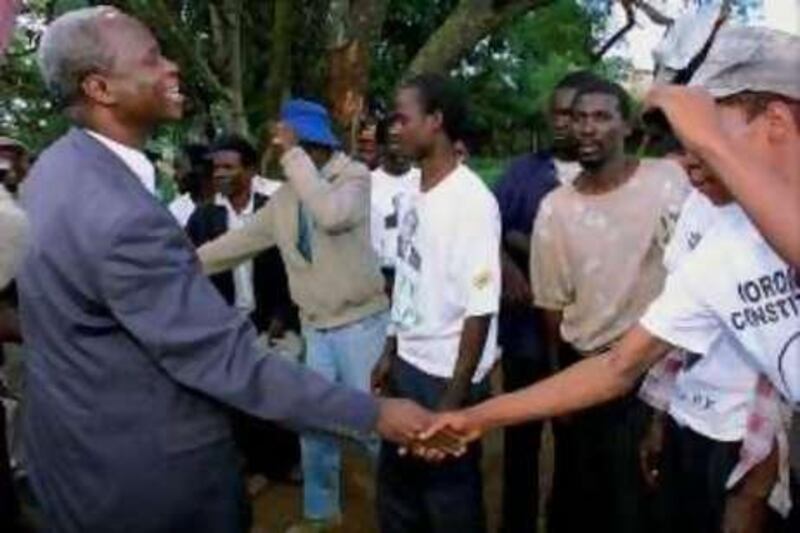BULAWAYO, ZIMBABWE // Veterans of Zimbabwe's 1970s liberation war who went on to became enforcers for Robert Mugabe, the president, are in disarray, a development analysts say could weaken his party's future election campaigns. The militants led bloody campaigns for Mr Mugabe during several elections over the past eight years - intimidating, beating and sometimes killing opposition supporters. But now veterans who fought the liberation war under Zimbabwe People's Revolutionary Army (Zipra), the military wing of the Patriotic Front-Zimbabwe African People's Union (PF-Zapu), have broken away from the original Zimbabwe National Liberation War Veterans' Association (ZNLWVA). They say they are being sidelined by former fellow association members who fought under the Zimbabwe African National Liberation Army (Zanla), the former military wing of Mr Mugabe's party, the Zimbabwe African National Union (Zanu), which was populated by elements from the country's dominant Shona tribal grouping. Only a few former Zipra combatants, the rebels say, are benefiting from ministerial, ambassadorial and senior civil service appointments or other government-supported programmes, whereas their Zanla colleagues are enjoying the lion's share of the national cake. The Zipra liberation fighters fought under the late vice president, Joshua Nkomo, and mostly came from the Ndebele-speaking Matabeleland region, in south-western Zimbabwe. Before their planned rally here on Saturday, apparently to test the waters for a Nov 25 inaugural convention, they have already appointed an interim executive. Reports say the veterans' breakaway is a precursor of plan to revive Zapu, their former party, which united with Mugabe's Zanu in 1987 to form Zanu-PF. Given the split, said John Makumbe, a professor of political science at the University of Zimbabwe, Mr Mugabe might no longer depend on the war veterans. "They used to give him strong and unconditional support, but even they no longer see value in supporting him. It will certainly have an impact on Zanu-PF because without war veterans and the youth militia, the party cannot campaign. But this is a pattern we have seen since February." Mr Mugabe is battling internal divisions, which exploded on the eve of the March general election when a faction sponsored by Simba Makoni, a former minister and member of Zanu-PF's top secretariat, decided to contest the presidential election as an independent. Ray Ncube, a retired army colonel now interim chairman of the Organisation of Zipra Veterans, is bitter that despite liberating their country from British colonialism in 1980, members of his organisation continue to wallow in abject poverty. "The main reason why we have broken away from ZNLWVA is that our membership of that organisation has not helped," Mr Ncube said. "If you want to see a poor veteran, just look around for a former Zipra soldier. He has no land, no formal job, and no money to fend for their families. To see a former battalion commander, who sacrificed his life to liberate his country, sustained lifetime injuries during that war, living in abject poverty is painful. You ask yourself why we went to war in the first place." Another grievance, said John Gazi, the interim secretary of the veterans' group, was the failure by Mr Mugabe's government to return 20 farms and 28 businesses, seized from Zipra in the 1980s after armed clashes between Zipra elements and the national army. Of the 25 farms that were taken, Mr Gazi said, five farms have been returned and only two of the 30 businesses seized have been officially handed over. Numbering about 30,000, the veterans shot to prominence in 1997 when they staged raucous demonstrations, including one inside a high court during a sitting, to arm-twist Mr Mugabe to award them gratuities of US$4,000 (Dh14,700) each and lifetime pensions. This triggered a crash of the local currency, and pushed the economy into a downwards spiral from which it has yet to escape. In June 2000, as Mr Mugabe faced what looked a certain electoral defeat at the hands of the then few months-old opposition Movement for Democratic Change, he invited war veterans to boost his campaign. An orgy of violence targeting MDC supporters followed and his party won the legislative poll by a five-seat margin. Worse violence followed in July the same year, when the ex-combatants, with tacit government backing, led countrywide invasions of white-owned farms. The MDC estimates that between this year's March election and the June presidential election runoff, about 100 of its supporters were killed by suspected Zanu-PF supporters led by war veterans and the youth militia. Timothy Sibanda, 56, a former Zipra cadre loyal to the breakaway group, said he was a foot soldier of Zanu-PF's re-election campaigns, but he had nothing to show for that. "Zanu-PF would have been history were it not for our work, especially in rural areas," Mr Sibanda said. "People laugh at us because we remain poor despite our hard work." However, Joseph Chinotimba, the self-styled commander of the 2000 farm invasions, said Mr Ncube and his ilk have no future. "They are misguided elements who have no support on the ground. "But I must say Zanu-PF and genuine war veterans are one. The ministers that you see are war veterans. President Mugabe belonged to Zanla and his first vice president Msika was Zipra. So the point is Zanu-PF and war veterans are united." * The National
Some veterans refuse to fight on for Mugabe
PF-Zapu militants who took on the role of the Zimbawe presidents violent enforces say they have been abandoned by the ruling party.

Editor's picks
More from the national




